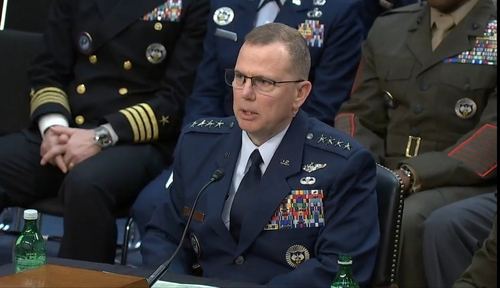US general voices concerns over 'increasingly advanced' long-range NK missiles
By YonhapPublished : March 15, 2024 - 09:04

A US general took note of military threats from "increasingly advanced" long-range North Korean missiles on Thursday, while highlighting evolving security challenges from China, Russia and Iran.
Gen. Gregory Guillot, the commander of US Northern Command and North American Aerospace Defense Command, attended a hearing of the Senate Armed Services Committee to testify about the posture of his commands and discuss security risks facing the United States.
"North Korea continues its bellicose rhetoric while test-launching increasingly advanced long-range missiles and expanding its ties with China and Russia," Guillot said.
In the absence of dialogue with Seoul and Washington, Pyongyang has been doubling down on projects to develop various formidable weapons, including solid-fuel intercontinental ballistic missiles that observers worry could enable the regime to make a surprise missile launch.
With the North Korean threats and other risks "firmly in mind," the Air Force general said his commands are trying to improve "domain awareness" in order to "detect, track and defeat" threats ranging from long-range ballistic missiles to small unmanned aerial systems.
"The defense of North America is an active endeavor that requires NORAD and NORTHCOM to campaign against threats in all domains along all approaches," he said.
Touching on China, Guillot noted that the Chinese military "modernizes and grows at a rapid pace."
"The PRC is expanding nuclear capability and capacity alongside its development of modern submarines, missiles, hypersonic weapons. All present significant challenges for homeland defense," he said, referring to China by its official name, the People's Republic of China.
The general called Russia an "immediate nation-state concern."
"Russia retains the world's largest stockpile of strategic and non-strategic nuclear weapons along with significant capacity to strike inside North America with air- and sea-launched precision conventional weapons," he said.
"Despite heavy losses to its ground forces in Ukraine, Russia has invested heavily in systems that can threaten the US, such as advanced guided missile submarines, hypersonic glide vehicles, ICBMs as well as significant cyber and undersea capabilities."
Regarding Iran, the commander said that while the Islamic Republic lacks the capability to strike North America with long-range missiles, it is investing in that capability.
"Iran also supports violent militant groups in the Middle East and maintains a worldwide network of operational circuits," he said. (Yonhap)



















